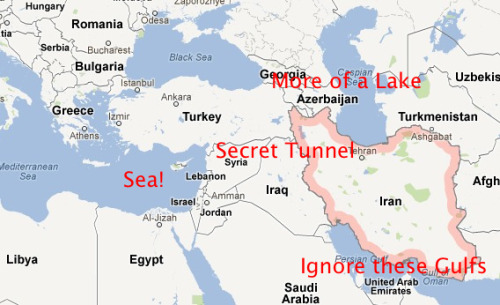As a foreign policy enthusiast, it always comes as a shock to learn how little most Americans care about what's going on in other parts of the world. Perhaps it's more that they are unaware of the political situations in other countries, but in my opinion, that is still an unforgivable offense. If you were to ask the average person on the street, "What are your feelings on going to war with Syria?", It would be safe to assume that the majority would respond somewhere along the lines of, " War with Syria would be a terrible idea!" -- and I would have to agree with them. Now, just for kicks, you ask another question, "Can you tell me who is the current ruler of Syria?" or better yet, "Where exactly IS Syria?" and I bet that most respondents will be left struggling to come up with an answer. Even back in 2012 in the race for the presidency, Mitt Romney was caught with his pants down when he claimed that Syria was Iran's direct route to the sea. Fyi, Iran already borders the sea... on two sides. ( Image below for your viewing pleasure)
Although this foreign policy gaffe comes from last year's election, it is more than frightening that a presidential candidate knew that little about the region currently drawing on massive amounts of U.S. diplomatic and military resources.
Poking fun at Romney aside (however fun it may be), U.S. politicians are not the only members of society that can be faulted for their ignorance and apathy. When it comes to foreign policy, many Americans simply brush it off and refuse to believe that their country's fate is interlinked with events transpiring across the globe. To quote a professor of international politics at Tufts in an opinion piece he wrote for the New York Times, "Foreign policy is boring, but important." Now, I don't necessarily agree with the "boring" part, but I would be willing to bet my bottom dollar that a majority of Americans who read this sentence were vigorously nodding their heads in approval.
At crucial junctures, such as presidential elections, the continuing economic stagnation and our most recent shutdown fiasco, people tend to focus their efforts on the issues closest to them -- and understandably so. Many would ask themselves, if people are suffering in our own country, then why should our government focus its efforts abroad? Now, I am by no means arguing that our economic and political situation does not require our attention, but I do not believe that this should distract from our relationships and dealings with other nations. We still need government officials and policy-makers to focus on halting Assad's murder of innocent Syrian citizens and to monitor the successful --for now-- dismantling of his chemical weapons program. Our efforts must also stay focused on Syria to prevent the rise of the Al Qaeda-affiliated Al Nusra front that has emerged from the chaos. We most certainly need to continue monitoring the situation in Iraq because, although we pulled out the majority of our troops, we caused a great deal of destruction to an already ailing nation. If we cease to care now, the situations in these nations will continue to deteriorate and our negligence may come back to bite us in the future.
In addition its current status as global watchdog, the U.S. government needs to maintain old diplomatic relationships and continue to build new ones -- something our economic and more recent partisan issues has hindered. Our more important role on the world stage and higher levels of global interconnection demands a greater awareness of foreign affairs from all of us, especially those in positions of power. Ignorance in this domain is a dangerous beast and can only lead to a repeat of the disasters similar to Iraq and Afghanistan and the continued disintegration of the United States' relationship with the leaders of Arab nations.
Now, it may seem as if I am being overly critical of U.S. citizens and policy-makers, but I assure you that is not my intent.Foreign policy is a dynamic field of study and even I cannot profess to be an expert in the region -- but I have committed myself to developing my understanding in order to become a more conscientious citizen. Here are some reasons why everyone should take some time out of their day to learn more about happenings in other parts of the world:
1) All Americans know that wars are being waged in the Middle East, but learning why they are occurring will bring a much deeper understanding of a region plagued by social, political, religious and economic issues -- this knowledge can only increase our government's production of viable policy solutions.
2) Learning where different countries are geographically speaking will also aid in our understanding of the region's conflicts. For example, the Syrian refugee problem in Turkey would make a great deal more sense if people knew that the two countries share a border. Plus, geographical skills are always impressive.
3) Increased awareness of regional conflicts creates more informed and capable voters. (The U.S. economy is important, but we're also spending billions of dollars in the Middle East)
Hopefully this serves as instructive. I am not writing for the sake of criticizing, but to push people to develop greater global cognizance!
Food for thought.

No comments:
Post a Comment